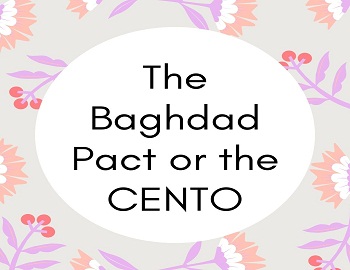The Baghdad Pact:
The beginning of this pact was made on the 24th February 1955, when the Prime Ministers of Iraq and Turkey entered into a pact pledging themselves to “co-operate for their security and defence”. Article 5 of the pact throws membership open to states “actively concerned with the security and peace in this region”; (Middle East) and by virtue of it, Great Britian acceded to the pact on 24th April 1955.
According to Loy Henderson, “The USA has demonstrated its belief in an unqualified support for the aim and ideals of the pact”. According to another statement, this pact is a normal development that should promote peace, stability and well-being in the area. In no respect can this natural association be deemed hostile or threatening or directed against any other nation”.
The Baghdad Pact consists of a Preamble and 8 Articles. The Preamble states that friendly and brotherly relations existing between Iraq and Turkey are in constant progress and it is desirable to implement the contents of the treaty of friendship and good neighbourliness concluded between Iraq and Turkey on the 29th March 1946 which recognized the fact that peace and security of all the nations of the world and in particular the nations of the Middle East and is the basis of their foreign policies”. Under the above circumstances the Baghdad pact was created”.
Provisions of the CENTO or the Baghdad Pact:
Article 1 of the Pact provides that the High Contracting Parties will cooperate for their security and defence. Such measures as they agree to take to give effect to this cooperation may form the subject of special agreements with each other.
Article 2 provides that in order to ensure the cooperation mentioned above the component authorities of the High Contracting Parties will determine the measures to be taken as the present pact enters into force. Those measures become operative as soon as they have been approved by the governments of the High Contracting Parties.
According to Article 3, the High Contracting Parties undertake to refrain from any interference whatsoever in the internal affairs of each other. They will settle any dispute between themselves in a peaceful way in accordance with the United Nations Charter.
Article 4 provides that the High Contracting Parties declare that the provisions of the present pact are not in contradiction with any of the international obligations contracted by either of them with any third state or states. They do not derogate from and cannot be interpreted as derogating from the said international obligations. The High Contracting Parties undertake not to enter into any international obligation incompatible with the present pact.
Article 5 provided that this pact shall be open for accession to any particular state of the Arab League or any other state activity concerned with the security and peace in this region and which is fully recognized by both the contracting parties. Accession shall come into force from the date when the Instrument of Accession is deposited with the Ministry of Foreign Affairs of Iraq. Any acceding state party to the present pact may conclude special agreements with one or more state parties to the present pact. The competent authority of any acceding states may determine measures in accordance with Article 2. Those measures will become operative as soon as they have been approved by the government of the parties concerned”.
Article 6 provides that a Permanent Council at ministerial level will be set up to function within the framework of the purposes of this pact when at least 4 powers become parties to the pact. The council will adopt its own rules of procedure.
Article 7 provides that this pact shall remain in force for a period of 5 years renewable for another 5 year period. Any contracting party may withdraw from the pact by notifying the other parties in writing of its desire to do so, 6 months before the expiration of any of the above mentioned periods, in which case the pact remains valid for the other parties.
Article 8 provides that this pact shall be ratified by the contracting parties and ratifications shall be exchanged at Ankara as soon as possible. Thereafter, it shall come into force from the date of the exchange of ratifications.









Comments (No)